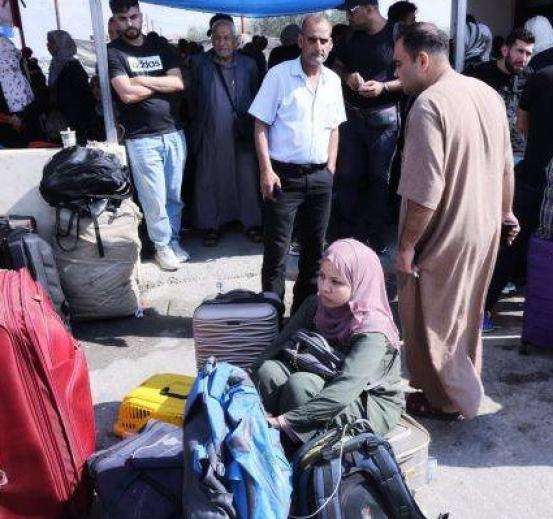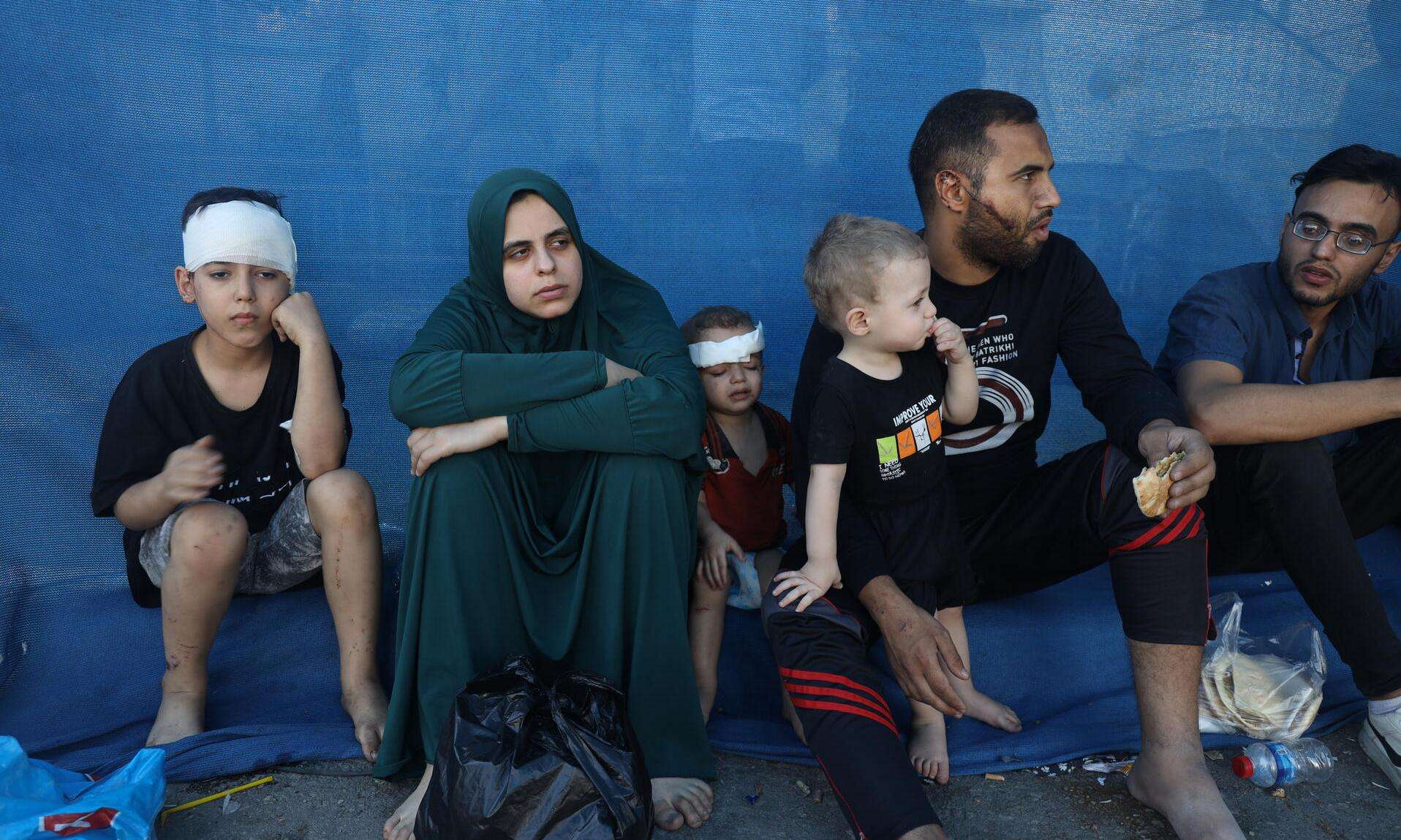Last updated on July 22, 2024
All over Gaza, Palestinians are suffering under Israeli siege and bombardment, losing loved ones, homes, and their own lives while world leaders fail to take meaningful action. Among them are Doctors Without Borders/Médecins Sans Frontières (MSF) staff members, many of whom continue to work and provide lifesaving care in hospitals and health centers across Gaza. These are their stories.
July 19
"She was breathing, so she must be okay, I thought."
Javid Abdelmoneim, MSF medical team leader in Gaza
"During mass casualty incidents, you stand there [the emergency room], in a puddle of blood and a crowd of people. It's loud, and you can really smell the blood all around. Crowds of people are trying to come in, while the security guards are doing their best to keep relatives and loved ones out, so not to overcrowd the hospital.
At Nasser Hospital, MSF provides surgical, trauma, and burn care to patients. On Saturday July 13, we received hundreds of injured, as well as people who had been killed, by an Israeli strike in nearby Al-Mawasi. The attack hit an area where Israeli forces had repeatedly advised displaced people to go. We first understood something bad had happened from the enormous explosions that were closer to the hospital than ever before. Almost immediately after, we heard the ambulances ...

July 15
“We felt the building shake”
Amy Kit-Mei Low, MSF project medical referent working in the maternity and pediatric department of Nasser Hospital
“On a normal day we are already overwhelmed. Nasser Hospital is basically the biggest functioning hospital in this area, but it can't treat the whole population. Last week the bed occupancy in the maternity department was at 214 percent, and the maternity department did 25 cesarean sections and some 200 deliveries. We are over capacity and the quality of care is going down due to the lack of supplies and space. How do you keep the intravenous line clean? How do you do all this if you have no gloves or chlorine? The situation yesterday was horrific.”

July 15
“I have never seen a mass casualty event like today”
Dr. Mohammad Abu Mughaiseb, MSF deputy medical coordinator Nasser Hospital’s trauma and burn unit
“While we were having our break in the backyard of Nasser Hospital, we suddenly heard three heavy airstrikes, which shook the whole hospital. In 15 minutes, we could hear the ambulances starting to arrive. Medical teams and MSF teams at the hospital decided to launch a mass casualty plan. They stopped working in the outpatient department and 20 of our medical staff went to support the emergency room. The situation was very tense and crowded, and a lot of injured people were arriving ...

"Everything is missing, even the idea of a future”
"We even had to shout to be heard, to overcome the sound of drones and bombs," said Davide Musardo, MSF psychologist, upon his recent return from Gaza. "War is everywhere in the hospital; the smell of blood is unbearable. This is the image I bring back from Gaza."
JUNE 10
"We did not have time to bury them"
Dr. Hazem Maloh, MSF doctor:
On the day of the attacks, I lived through three hours of real terror and fear. For one endless hour, I did not know where my eldest son was. He went to the market, and in a few minutes, everything had turned upside down. Minutes felt like hours.
There were sounds of missiles and explosions everywhere. We didn’t know what was happening. Everyone was screaming and running away in every direction. We could hear the sirens from the ambulances. It felt as if it was the end of the world.

JUNE 8
"There is nothing, nothing at all that justifies what I saw today. Nothing."
Karin Huster, MSF medical referent:
Today is Saturday and I just came back from Al-Aqsa Hospital. Things started happening around 11:30 a.m., when there was a huge blast right next to our office ... And we started to hear really, really intense IDF activity, lots of bombardments, lots of shooting, helicopters ... As soon as we were able to, we three clinicians decided to prepare a bunch of supplies and medicines and go and support colleagues at Al-Aqsa Hospital. We had also heard by then the plea of the Al-Aqsa Hospital director to come and help. It just took some time to clear everything from a security standpoint.

May 28
"I am speechless"
Dr. Safa Jaber, MSF gynecologist:
The situation in Tal Al-Sultan is very critical. All night, we could not sleep (thank God anyhow). All night we heard the clashes, the bombings, and the sound of rockets. Nobody knows what is happening exactly. There are clashes in two different locations in the Tal Al-Sultan area, in the north and in the south. I am speechless—I can’t even describe what is happening. We are scared for ourselves, for our children. We were not expecting this to happen so suddenly.

April 26
"I had no answers"
Amparo Villasmil, psychologist:
When we say that there is no safe place in Gaza today, we are not just talking about the shelling. There isn’t even a safe place in people's minds. They live in a state of constant alert. They can't sleep, they think that at any moment they are going to die; that if they fall asleep, they won't be able to react quickly and run away, or protect their family.
Once, I found a colleague—a psychologist—on the stairs. He’s usually a very energetic and upbeat person but he was leaning his head on his knees. He was on the verge of tears and told me how exhausted he was. He asked me what he was supposed to do, where he should go, and when this war would stop. I had no answers to give him.

"Words can’t describe it"
“We do not have electricity, water, or connection,” said Loay Harb, an MSF nurse in Gaza City. “We have no flour. We have no way of communicating with the world. We are going through very difficult times."
March 8
"We are trying to survive hunger."
Suhail Habib, vehicle maintenance supervisor
“Life has not only become difficult, but it has become five times harder. We can’t find flour because the Israeli army blocked it. We are forced to eat animal food just to survive. Sometimes we eat bird food, donkey food, and sometimes grass which we pick from the corners of the streets. We are trying to survive hunger.
I go three days without food, and my wife keeps asking me: ‘What did you eat today?’ I reply that I’m not hungry. I come home empty-handed, with no food, barely any flour, no bread, no rice. Today, 1kg of rice costs $33 so I can’t afford to feed the children ...
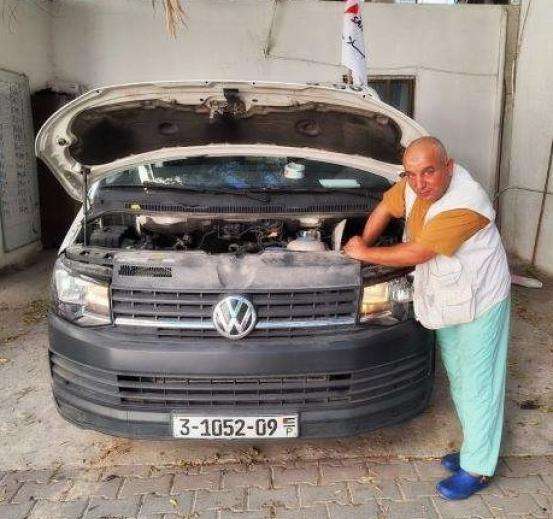
February 12
“We don’t know if we will survive the next hour”
Anonymous MSF staff member
"Today is Monday, the 12th of February, 2024. I was awakened at midnight because of bombing and couldn't fall asleep again. Around 5:00 a.m., there was a very strong airstrike, and in the beginning I thought it was my home. Then within seconds, I remembered my kids and I heard things falling apart in the room, so I covered my youngest daughter who was sleeping on my arm with sheets and went running to my other kids ... There were a lot of things hitting my back—stones, wood, a lot of other things that I couldn't understand in those few seconds...
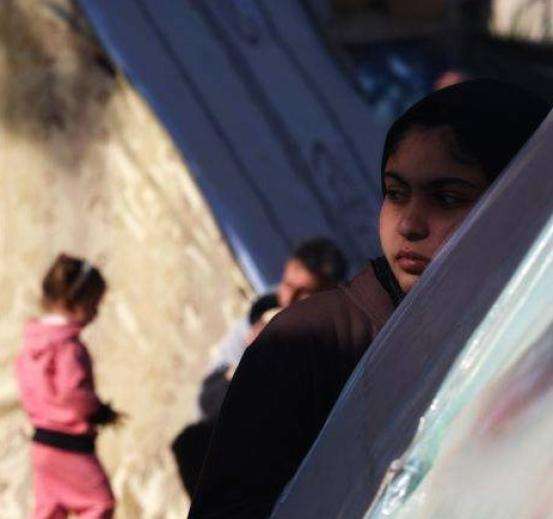
February 12
"Where is it safe?"
Lisa Macheiner, project coordinator
"There were attacks in Rafah yesterday [February 11] and also during the night. From Khan Younis, we could hear a lot of heavy explosions. Our windows and doors were shaking throughout the whole night. It was very, very noisy.
People don't feel safe. Children are terrified. They are distressed and it's been going on for months now and people are exhausted. There are hundreds of thousands of people everywhere. There is no space anymore. There is no space to move in a car. There is sometimes even no space to walk ...
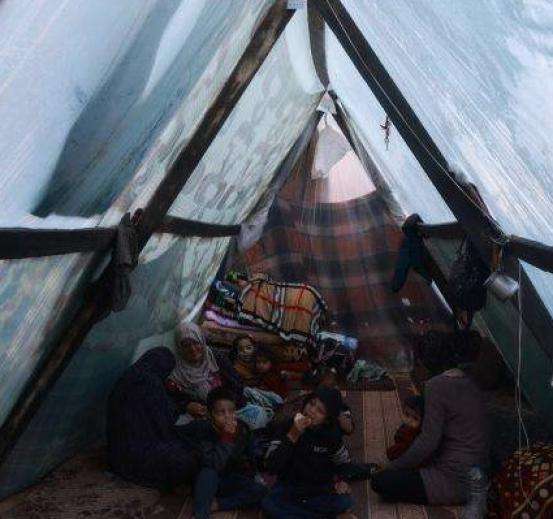
“The hospital is almost collapsing”
"Doctors, nurses, and medical staff have been exhausted for 23 days," said Dr. Abu Abed, MSF's deputy medical coordinator. "Surgeons are operating on the ground, on the floor, they are operating everywhere."
“Mom, can we leave Gaza now? I really just want to live.”
Dr. Ruba*, an MSF doctor, shares an update on her situation and the heartbreaking conversations she has with her children about the very real possibility of death.
February 3
"Babies who never learned to walk, and never will"
Marie-Aure Perreaut Revial, emergency coordinator
"One day we were alerted that an MSF staff member and his family had arrived at the emergency department, badly injured. Colleagues rushed to find them in the chaos.
Later, Dr. Samir* told me, 'I had to make a choice—I saw Ghassan* and his son, they needed me, but next to them I saw a woman critically injured, who also needed me. What was I supposed to do?'
Health care workers are forced into decisions like this every day in Gaza ...
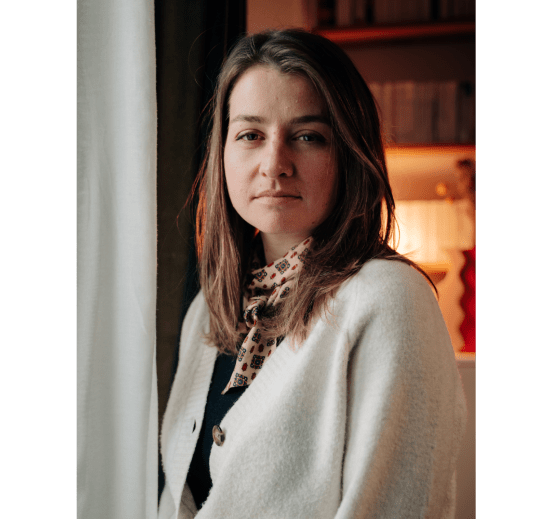
January 31
"They work in terrible conditions"
Aurélie Godard, head of medical activities in Gaza
"In the emergency room, we saw a seriously injured patient who had arrived the day before. He’d had a tracheotomy, a chest tube inserted, and also abdominal surgery. He was surrounded by dozens of other patients in a room without electricity as generator fuel is scarce, and therefore his vital functions weren’t being monitored because the monitoring devices were not working. The team told us that they had recently lost a patient because they were unable to give him a blood transfusion. Their blood bank was empty. They work in terrible conditions ...
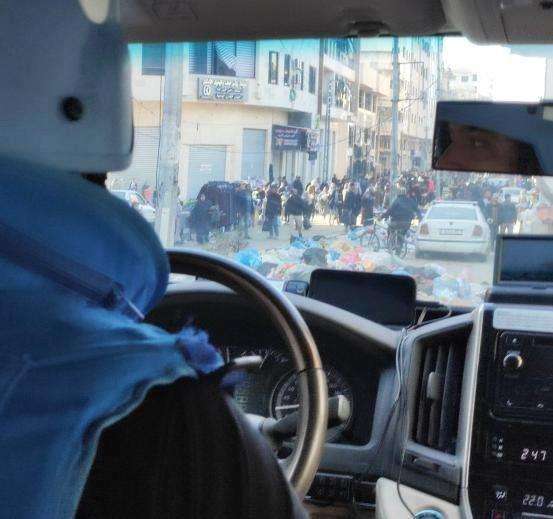
"They use it once, then squeeze out the blood"
"They said that they didn’t have any [abdominal gauze] to spare, and that the ones they had were already being used on several patients," said Rami, an MSF nurse who was trapped in Nasser Hospital. "They use it once, then squeeze out the blood, wash it, sterilize it, and reuse it with another patient. This is the situation in Nasser’s operating theater—can you imagine?"
January 12
"Attacks on hospitals are a fact of life"
Dr. Aldo Rodriguez, MSF surgeon
"My first hours in Gaza were marked by the constant buzz of the drones Israel uses to surveil the enclave. The stressful, loud sound can be heard non-stop, all day and even at night. I also saw landslides, collapsed buildings. Even though I knew about the dire conditions in Gaza ahead of time, it was still shocking to see everything in ruins and people looking for food under the rubble and waiting in endless lines to get some bread. There isn't a place in Gaza that doesn't have a shattered building ...
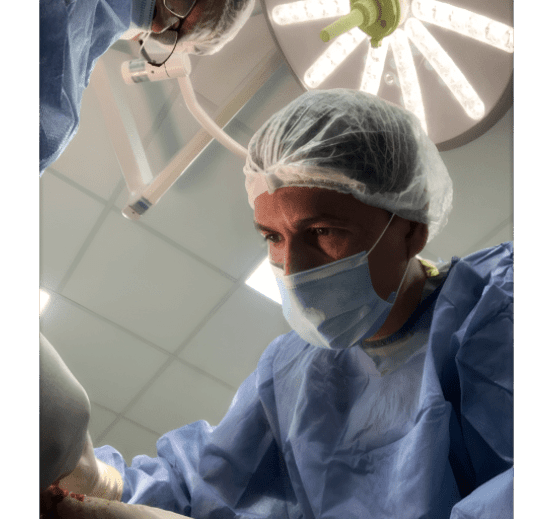
"It's getting very, very complicated."
"They were asking if it was safe," said Carolina Lopez, MSF emergency coordinator. "And I cannot say to my staff, 'this place is safe.' I mean, there is no safe place in Gaza ... We cannot ensure the safety of our own staff. We cannot move, we cannot arrive at, we cannot work in the hospitals that are around because they are not secure either."
January 16
"She gave birth to him in the latrines closest to her tent"
Pascale Coissard Rogeret, emergency coordinator
"This week, I sat down with some of our patients at Al-Emirati Hospital in Rafah, where people receive postpartum care. In addition to the exhaustion of childbirth, they must contend with the constant stress of bombings, displacement, poor living conditions in Rafah, and the uncertainty of what tomorrow holds. Three of these women’s stories particularly struck me ...
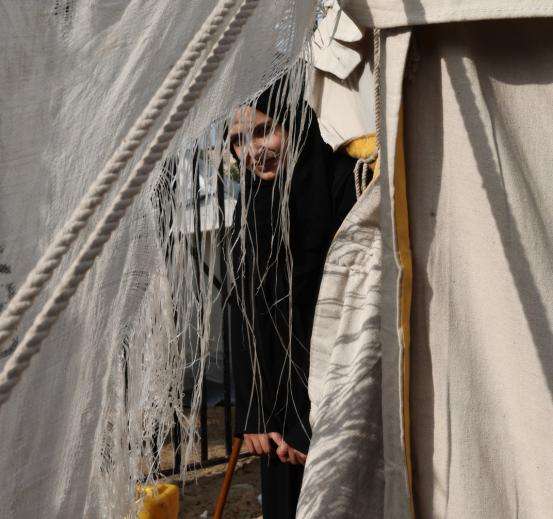
December 28
"Staff are literally kneeling in blood on the floor"
Jacob Burns, project coordinator
"As I type this in the pre-dawn dark of Al-Mawasi—the coastal strip that Israel has designated as the humanitarian zone—I can hear bombs every minute hitting Khan Younis, two miles away in the south of Gaza. The house where I’m staying intermittently shakes with overwhelming force.
Earlier this week, a team of my colleagues were in Nasser Hospital, where we provide emergency care and surgical treatment, including to patients with traumatic injuries and severe burn injuries. We had been assured by the Israelis that the hospital would not be targeted. Yet, while we were there, leaflets suddenly fell from the sky ordering the immediate evacuation of premises near the hospital, including the road we use to get in and out of the facility...
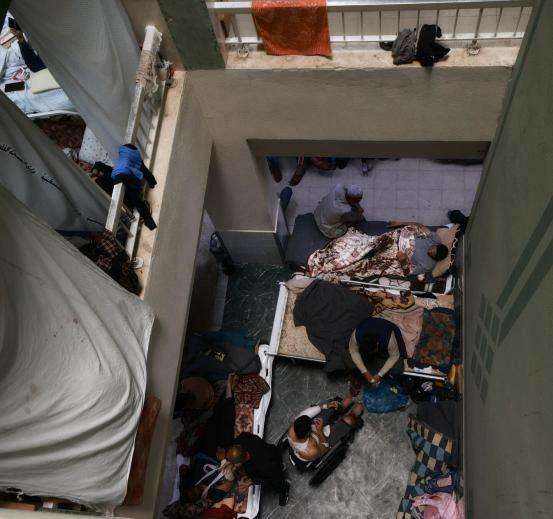
"Staying alive is only a matter of luck"
"It was heartbreaking—running away and having to look at Palestinian colleagues and neighbors who had been with us all the time, helping us with everything, and knowing that most probably I would never see them again," said Ricardo Martinez, MSF logistics coordinator.
December 8
“After 60 days of war, I'm losing hope”
Dr. Ruba, MSF doctor
"We are displaced south from the valley, which is supposed to be a safe area, but every night, every day, there are airstrikes. They are targeting everybody. Nobody is safe.
There are a lot of different types of injuries. We saw burns from different kinds of sources. We saw raw areas. We saw fractures. Also, there are a lot of kids with amputations. We have only the primary medical supplies with paracetamol, ibuprofen, and dressings, and unfortunately, we don't have access to our clinic. The Israeli army cut the road...
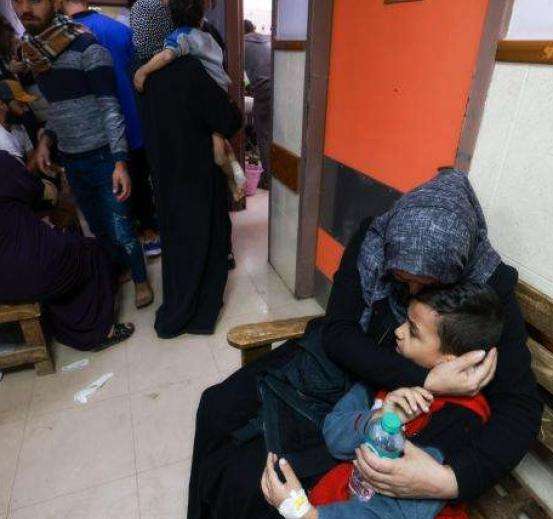
November
"They started opening fire at us"
Anonymous MSF staff
“When we arrived at Al Wahida Street, I saw tanks and snipers at the top of the buildings. I was terrified when I saw that the snipers and the tanks were pointing their weapons at us, especially at the fourth and the fifth van [in the convoy]. They started opening fire at us and when a bullet grazed my forehead, I got a superficial injury.
The bullet hit my colleague Alaa in the head, he sat next to me. He got a critical head injury and started bleeding massively. His head fell on the steering [wheel] and I immediately retook control of the [vehicle] to move to the right of the street."
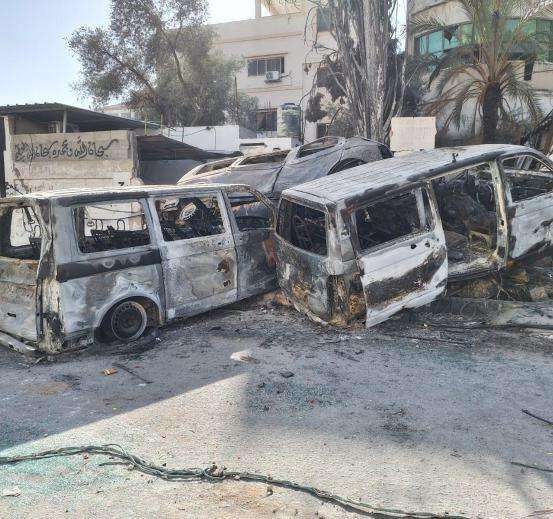
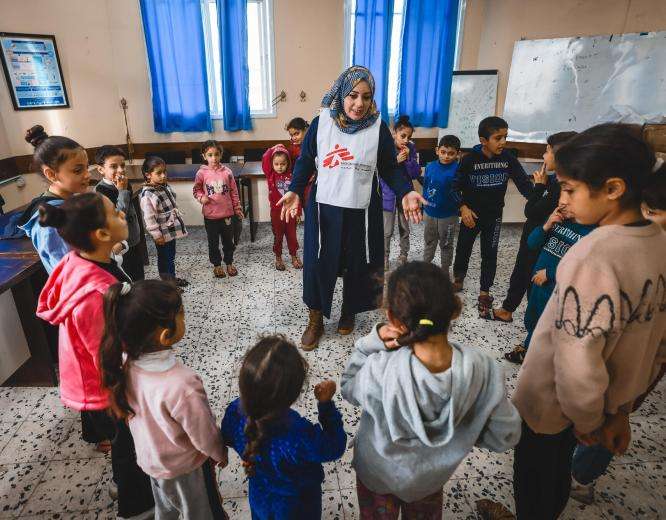
"We try as much as possible to give them support"
“As a psychologist, the most common things I see among children are nightmares, bed-wetting, anxiety, fear. We try as much as possible to give them support via recreational activities. After that, we will work with the mothers through psychosocial education to explain what might happen to them because of the situation and how can they deal with it." — Marwa Abu Al Nour, MSF psychologist at Martyrs Clinic
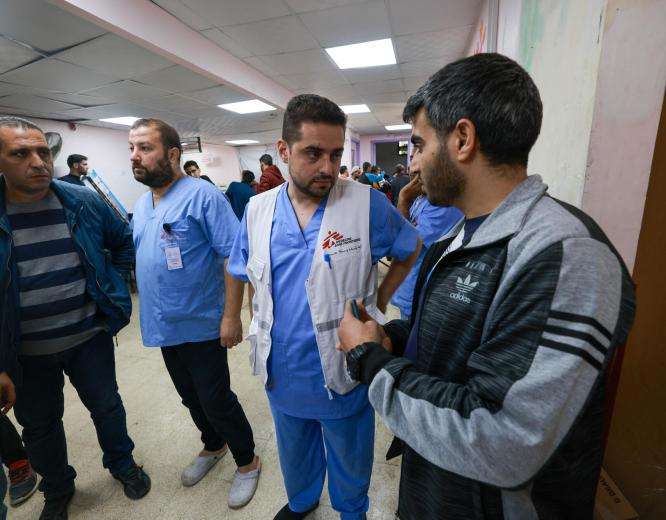
"The situation here is horrific"
"The number of patients [is] enormous," said MSF's Dr. Sohaib Safi. "We're talking about more than 600 patients with more than 90 percent of these patients with open wounds that need dressing and they have a lot of infections."
“The only remnant of his family”
“Since the war started until now, I have been working non-stop, 24 hours, all the days," said Dr. Hafez Abukhussa, a reconstructive surgeon at Nasser Hospital. "Can you imagine to receive 100 cases or 200 cases a day, sometimes 500 injured patients a day?"
"The ones who were not dead, will likely die very soon"
Christophe Garnier, an MSF project coordinator, arrived in Gaza with a medical team on November 14, 2023. Garnier described what they experienced in just the first few days—multiple mass casualties, patients, including children arriving severely injured, and many already dead.
November 11
“We are alone now. No one hears us."
Dr. Mohammed Obeid, surgeon
"We don’t have electricity. There’s no water in the hospital. There’s no food. People will die in a few hours without functioning ventilators.
In front of the main gate, there are many bodies. There are also injured patients; we can’t bring them inside. When we sent an ambulance to bring the patients—a few meters away—and they attacked the ambulance. There are injured people around the hospital looking for medical care. We can’t bring them inside. There’s also a sniper who attacked patients, they have gunshot wounds. We operated on three of them...
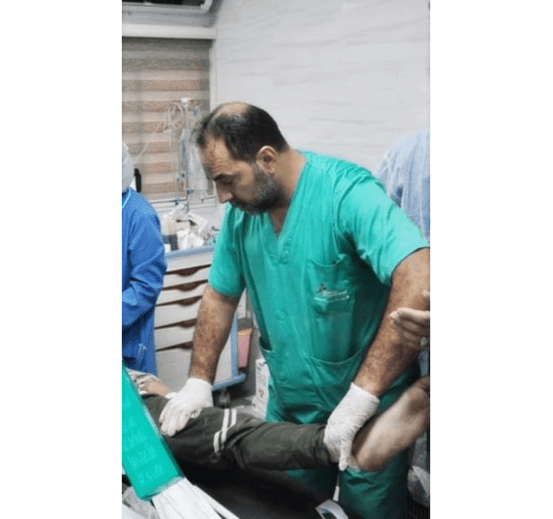
“Lives vanish in a split second here”
"Houses that we saw yesterday, driving down the street, are no longer there and it’s incredible to think that lives vanish in a split second here," said MSF emergency coordinator Nicholas Papachrysostomou.
"I can't leave if you're shooting at me."
MSF staff members share voice notes during the Israeli military’s siege of Gaza’s hospitals in November: "Now the situation is very bad. We can see actually the smoke around the hospital."
October 31
"Enough is enough"
Mohammad Hawajreh, nurse
"The situation inside Al-Shifa is unbelievable. When we hear ambulances or bombing, we go directly to Al-Shifa, even in the middle of the night. Every day, every hour, every moment—we receive casualties. Hundreds of casualties every day.
When people first come to the hospital, we receive them in the triage room. We try to stop the bleeding, cover the wounds, and keep them alive. Most of the patients are children and women. The types of wounds are unbelievable: shrapnel wounds on their faces, all over their bodies; bones exposed; internal bleeding after being under the rubble for hours; deep burns—40 to 70 percent of the body. Most of the wounds are infected. It's terrifying to express...
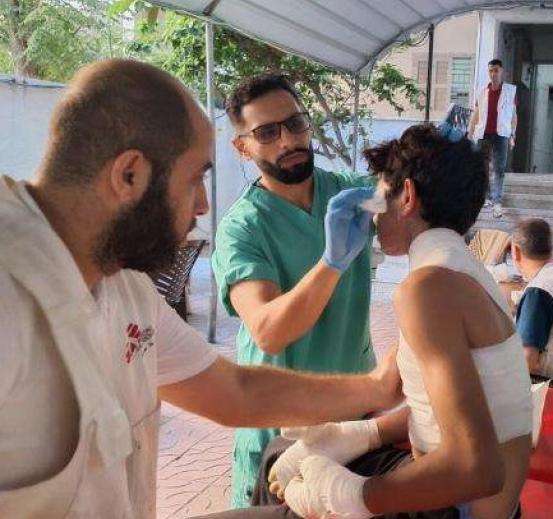
"I don't have a house now."
"They asked many times to evacuate this hospital. And we don’t. I mean, we cannot because they don’t say where to evacuate and how to evacuate our patients," said Dr. Nedal Abed, MSF orthopedic surgeon. "How to convince them to go outside? Where? Where to go?"
October 29
"We need to be strong and focus on saving lives"
Dr. Ahmad Abu Yassan, anesthesiologist
“In my last shift at Al-Shifa Hospital, most of the patients who reached the hospital died, some of burn injuries, some of penetrating or blunt trauma. Post-operative care is very limited since we work beyond our capacity. We are unable to isolate patients with infected wounds. I’m worried about bacterial resistance and infections. Anesthesia is very difficult because of the long duration of interventions and recovery, and the lack of equipment. The medical teams are exhausted mentally and physically, but we need to be strong and focus on saving lives."
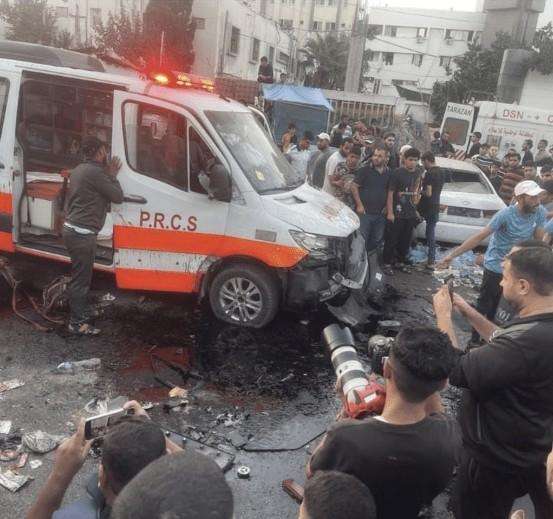
October 19
A day in the life of a mother in Gaza
Israa Ali, interpreter
"Words fail to describe a day in the life for people in Gaza right now. The morning starts while we are already awake. We toss and turn and try to sleep for a while, but the sound of bombs won’t allow it.
We lay awake, listening to the news on the radio. In this modern age, we should have electricity and internet access, but our phones are dead. We run to see whether there is fuel to turn on the generator, and then realize that the generator is dead, too. Here, we acknowledge that we live in besieged Gaza...
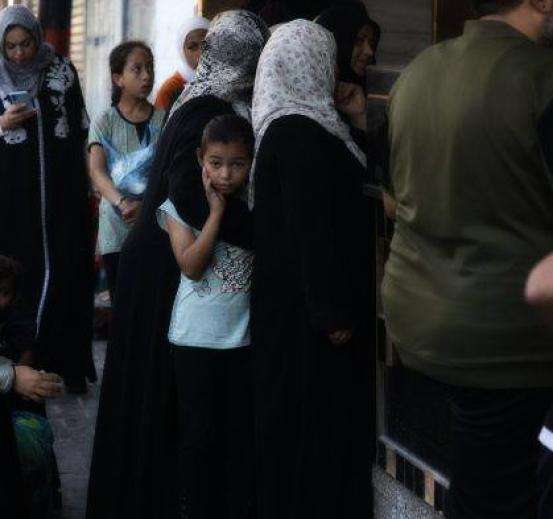
October 24
“We amputated him in front of his mother and his sister”
Dr. Mohammed Obeid, surgeon
"We lack instruments and we have a lot of cases, so we just amputated under slight sedation. The anesthetist tried to keep the boy’s mouth open to prevent strangulation. We amputated him in front of his mother and his sister because there is no space and the sister was waiting to be operated on next. You cannot imagine. This girl, this 13-year-old waiting for an operation, looking at me as I am amputating the mid-foot of her brother."
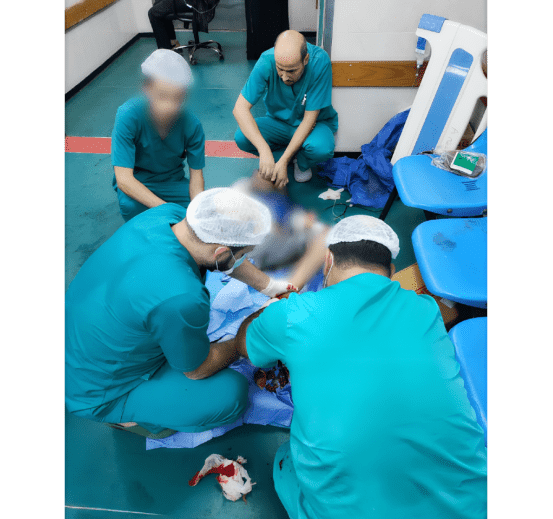
October 20
“God help us in this difficult time.”
Loay Harb, nurse
"At this moment, we do not have any drinkable water; the water we have is polluted and not safe to drink. We don’t even have fuel to pump water from the wells. Our families and kids are being displaced from the north to the south and from the south to anywhere else. We do not have any safe place to stay.
We delivered medical supplies to Al Shifa Hospital in Gaza City two days ago. [Reaching] the hospital was very tough. We saw hundreds of people taking shelter in the hospital and it was difficult to walk inside. It took us a lot of time to deliver the supplies...
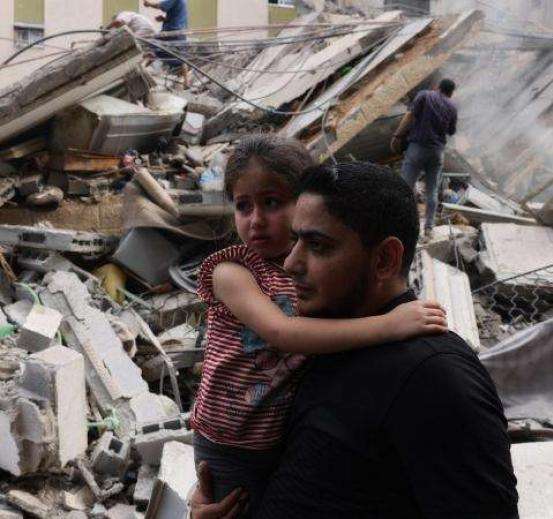
"We were for two hours searching for drinkable water"
Dr. Mohammed Abu Mughaiseeb, MSF's deputy medical coordinator in Gaza, describes what he and others in the area face.
October 14
"We left in a convoy of 300 cars at 8:00 a.m."
Louis Baudoin, communications manager
"I think at first, people didn't believe the evacuation warning. That's why in the morning there weren't many people here. Soon, cars started pouring [in] all day long until there was no more room. At that point, people continued to come on foot, parking outside the base with mattresses, a little food, some clothes, but not much luggage because everyone really left in an emergency...
